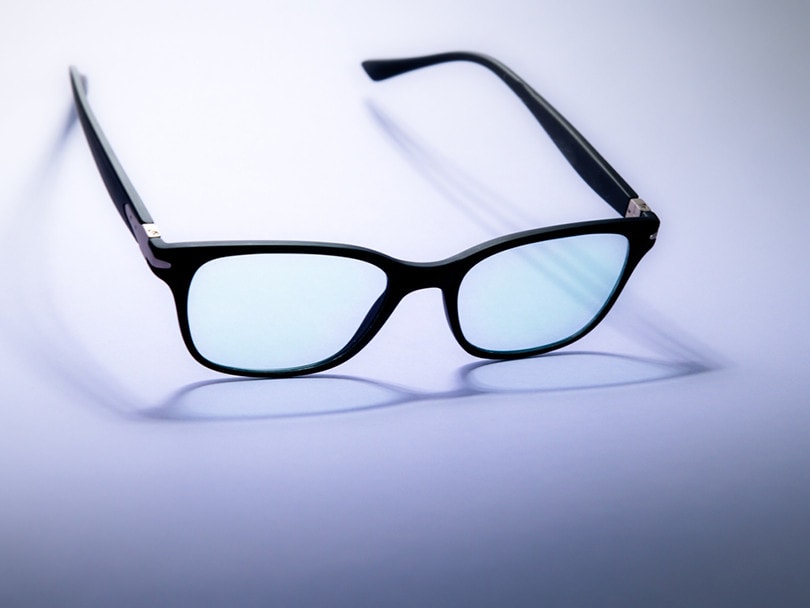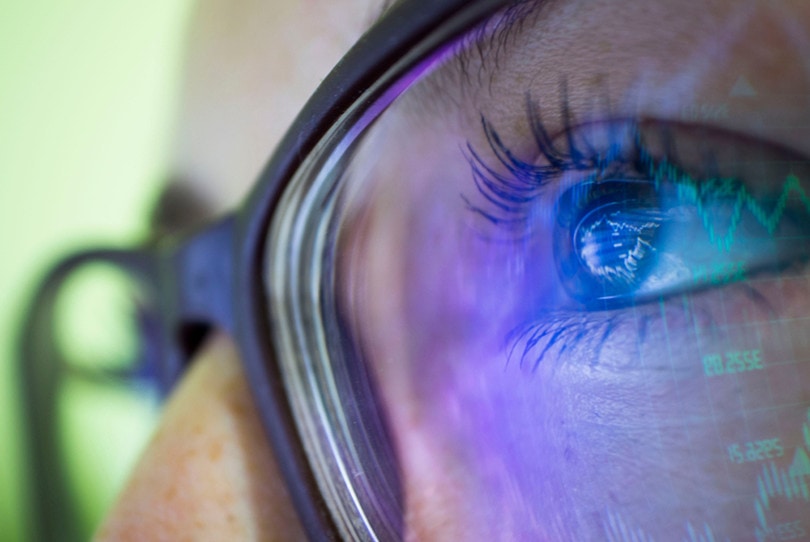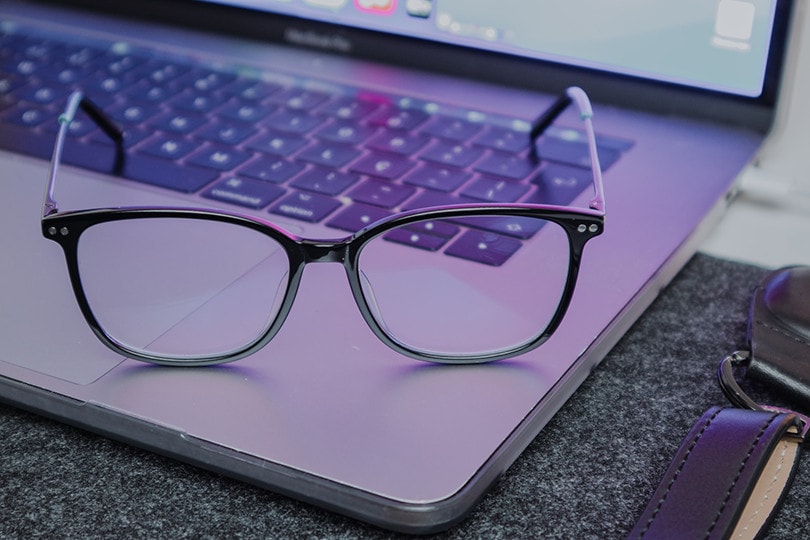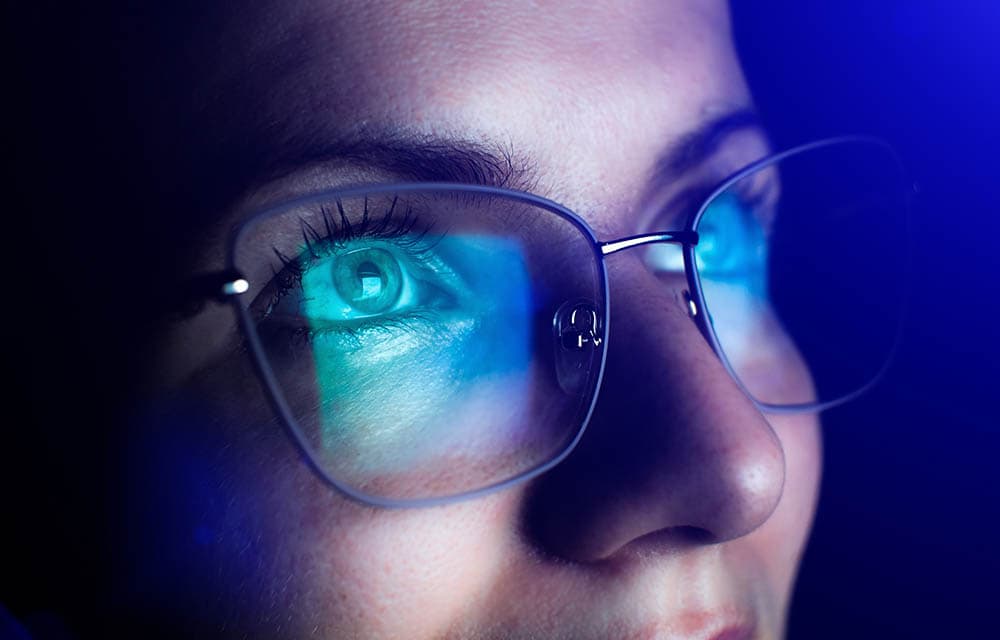Can You Add a Blue Light Filter to Existing Glasses?
Last Updated on

Americans spend an average of seven hours a day on their devices, while nearly 90% admit to the temptation to scroll before bed most nights of the week.1 It’s more than likely that you are part of that percentage. It’s understandable that with many more Americans working from home and anxiety levels at an all-time high, our devices can be a great distraction and tool to help us switch off.
While blue light is beneficial to our health, you may have heard that it has some potential health concerns. Blue light glasses are becoming popular to reduce exposure, but can you add a blue light filter to your existing glasses?
Yes, you can. You can visit your local optometrist and get a coating added to your lenses. You can also purchase blue light glasses to fit over your glasses. Before you decide if you need a blue filter added to your glasses, let’s explore the subject further.
What is Blue Light?
Each color has a wavelength and intensity, which impacts the light’s effect on your eyes. Blue light is all around you. It is made of short, high-energy waves almost as powerful as the UV rays are known to harm your skin and eyes. Fluorescent light bulbs emit blue light, as does the sun, but the concern is the exposure that human beings have to light-emitting diodes (LED) from the extensive use of devices that rely on this technology. Devices that rely on LED include laptops and tablets, cell phones, and flat-screen televisions. The screen may appear white, but the wavelengths measure between 400-490 nanometres, which is blue light.

Why Should I Get a Blue light Filter?
Blue light filters on your glasses are one way to minimize the blue light emitted from our devices. They can help reduce eye strain by increasing the contrast on your screen, making it easier to focus. Continued exposure to high amounts of blue light can lead to health problems. Unfortunately, the structures in the eye that protect it from some light do not keep blue light out.
Blue light exposure before bed can affect your sleep. It affects your ability to sleep by suppressing melatonin production in the body and interrupting the body’s natural circadian rhythm.
What Glasses Can You Get with a Blue Light Filter?
Your prescription glasses can be coated with an anti-reflective film with a blue blocker, or you can order clear polycarbonate lenses that contain pigment inside to filter the blue. While they are great options to reduce blue light exposure, they both have pros and cons.
The anti-reflective coating reduces blue light and eliminates reflection but only blocks out 85% of blue light. They also need to be cleaned regularly to prevent scratching.
Clear polycarbonate lenses are available for single vision and bifocals. They naturally block UV light while also blocking the same, if not more, blue light that the anti-reflective coating would.

Clip-on Blue Light Filters
Clip-on blue light glasses are another great option to add a blue light filter to your existing glasses. They are usually large enough to fit over your glasses comfortably, with a clip so tiny that it won’t interrupt your view. They are convenient for office environments, and you can clip them on when you are staring at the screen.
How To Limit Blue Light Exposure?

There are a few other ways you can limit your blue light exposure:
- Cut back on your screen time: You should try to avoid looking at your devices at least 2–3 hours before bed.
- Keep your eyes moist: Use eye drops to help your eyes stay moist during blue light exposure so that they don’t become irritated and dry.
- Dim the brightness and adjust the blue light on your screen: Adjust your brightness to dark or night mode. This will help reduce eye strain and sleep disturbance.
- Use blue light filters on your screen: You can purchase a blue light filtering sleeve to slip over your screen at night to reduce the glare.
- Install light-blocking software: Apps can be installed on your smartphones, computers, and tablets that help reduce the amount of blue light reaching your eyes without affecting the display.
- Use a dim red light: A red night light will assist your sleep patterns since red doesn’t affect your body’s circadian rhythm.
The 20/20/20 strategy is a great exercise to use while you are working. While you are using your device, stop every 20 minutes and find an object about 20 feet away and focus on it for 20 seconds before looking back at your screen.

Final Thoughts
If you are spending several hours a day looking at screens, it won’t hurt to add a blue light filter to your glasses. You can protect your eyes from exposure to blue light by simply adding an anti-reflective coating, purchasing blue light glasses or clip-ons, and taking precautionary steps to limit your exposure. Consult your local optometrist to see how to use blue light blockers with your prescription.
Featured Image Credit: Stereo Lights, Shutterstock
About the Author Robert Sparks
Robert’s obsession with all things optical started early in life, when his optician father would bring home prototypes for Robert to play with. Nowadays, Robert is dedicated to helping others find the right optics for their needs. His hobbies include astronomy, astrophysics, and model building. Originally from Newark, NJ, he resides in Santa Fe, New Mexico, where the nighttime skies are filled with glittering stars.
Related Articles:
Can You Use Binoculars to Look At Stars? How to Choose the Right Pair
How to Clean a Refractor Telescope: Step-by-Step Guide
How to Clean a Telescope Eyepiece: Step-by-Step Guide
How to Clean a Rifle Scope: 8 Expert Tips
Monocular vs Telescope: Differences Explained (With Pictures)
What Is a Monocular Used For? 8 Common Functions
How to Clean a Telescope Mirror: 8 Expert Tips
Brightfield vs Phase Contrast Microscopy: The Differences Explained
